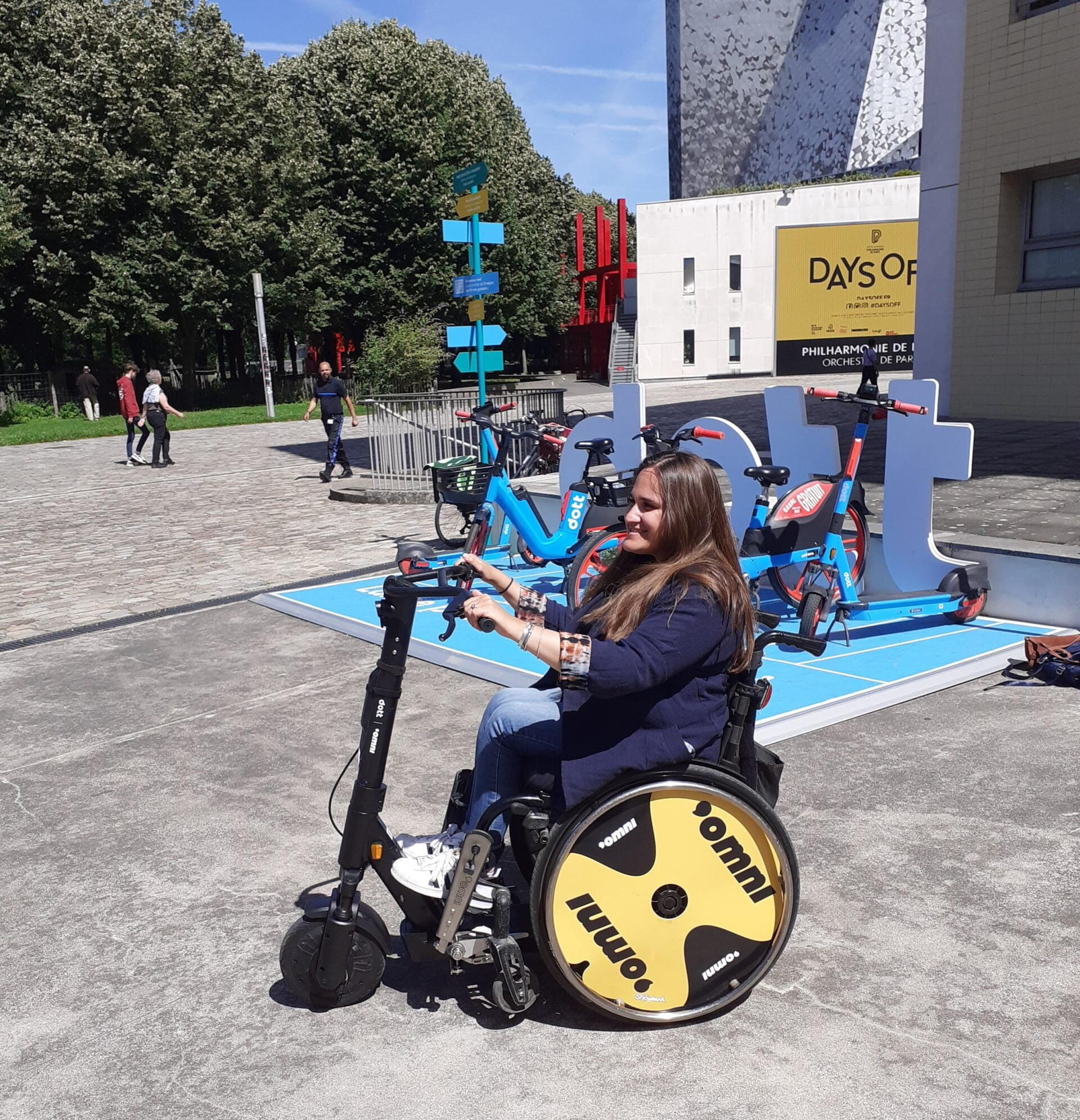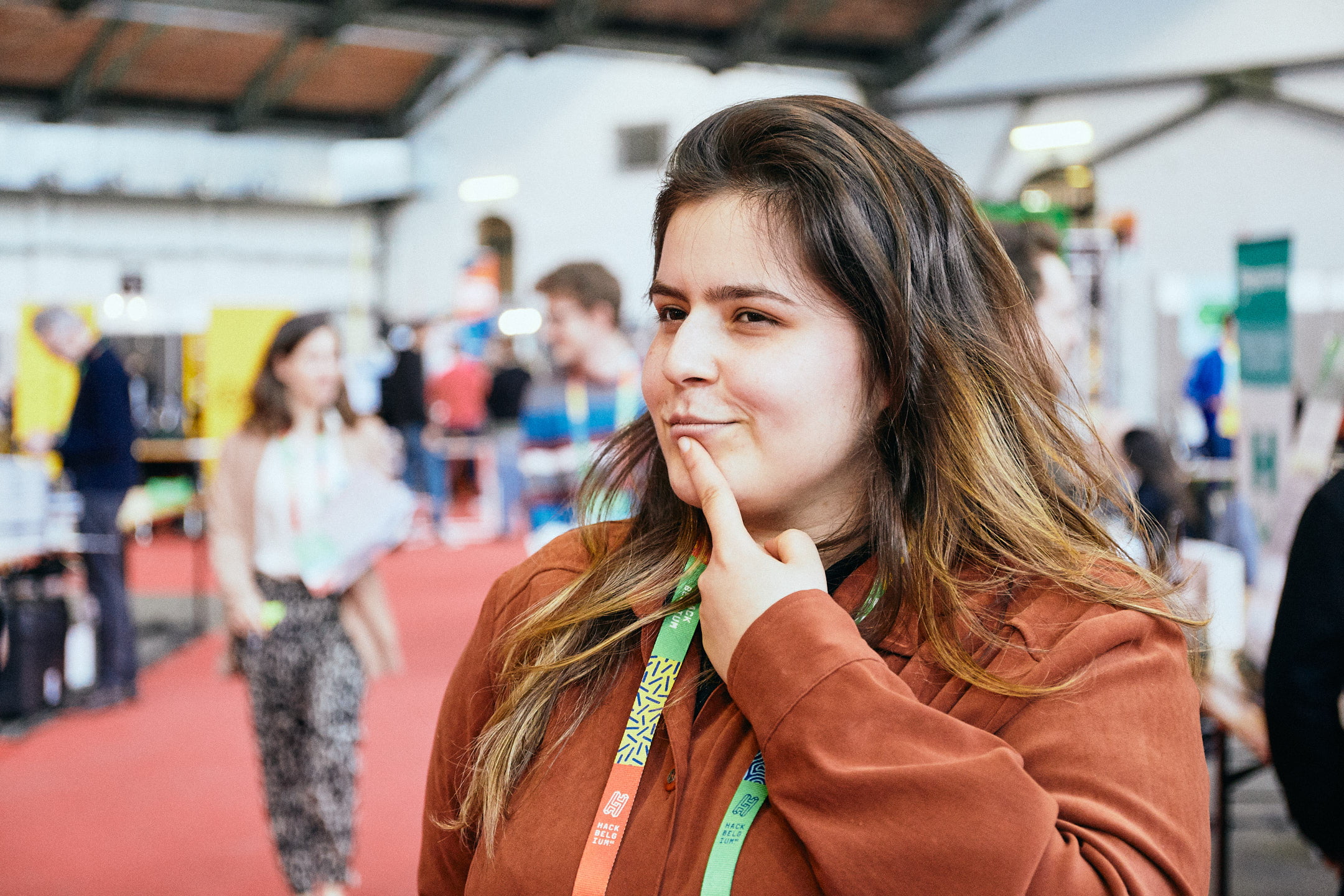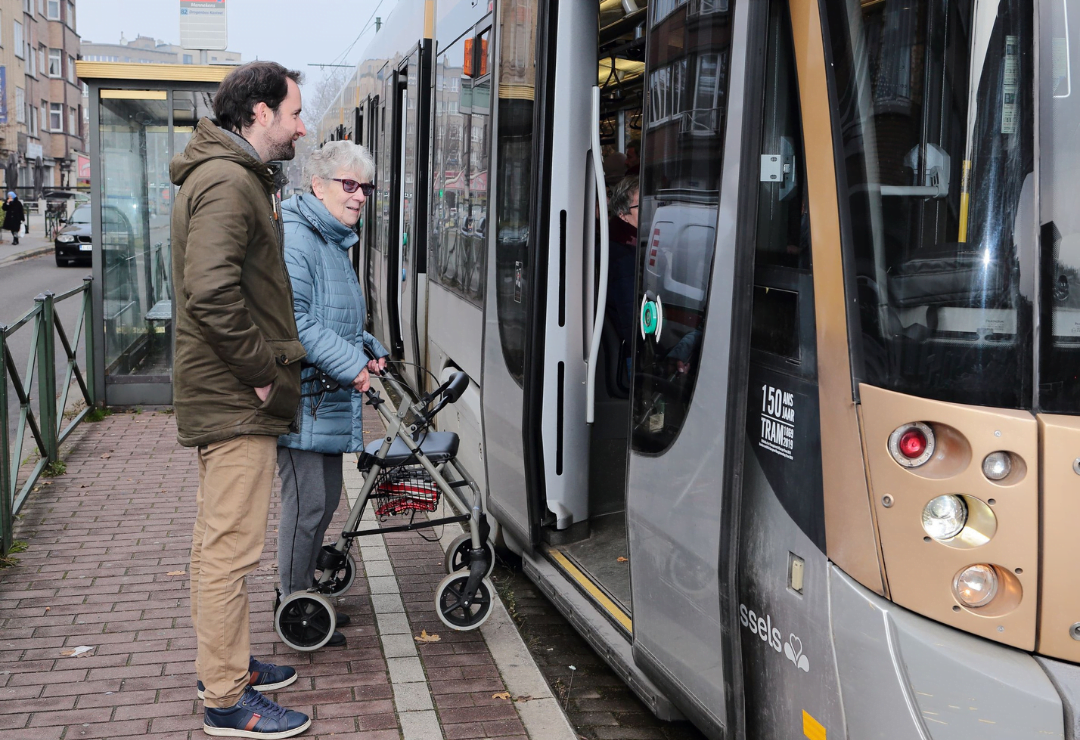Unlocking Inclusivity
Mobilising shared mobility services for a more inclusive and accessible future? Providers are leading the way! In this article, we delve into interesting examples from industry leaders Lime, Uber, Nextbike, Dott, and Voi as they strive to make transport services open to everyone, regardless of their mobility challenges. We also turn to POLIS member Mpact for an additional perspective on their ongoing research to provide more inclusive shared mobility services.
To listen to the recording of the article below, please accept all cookies.
Around 87 million people in the EU have some form of disability. Without accessible transport modes, people with different disabilities and health problems continuously face enormous obstacles: restricted travel options, limited leisure opportunities, and even reduced economic opportunities due to a lack of access to education and employment opportunities. While there have been many efforts across Europe to tackle this issue and make transport more accessible to people with specific mobility needs, many barriers still exist today across the entire mobility service offer.
Shared mobility is one of such services; and with its use having risen drastically over the last few years, it is surprising to see how there is little to no research regarding the shared mobility needs and preferences of people with disabilities in Europe. This makes it difficult for policymakers to design appropriate regulatory frameworks or for mobility providers to develop concrete solutions to foster systemic change towards inclusive shared mobility services. However, despite this gap in research, several shared mobility providers and organisations have already begun to address the need for more inclusivity and accessibility in their services. In this article, we review some of their efforts, looking at different examples from the private sector while also receiving an additional perspective from POLIS member Mpact, a non-profit organisation offering various shared mobility options.
Accessible shared vehicles: providers take charge
To improve the accessibility of shared mobility services, it is crucial to understand users’ requirements and needs. People with certain disabilities cannot use micromobility services, unless adaptative solutions are provided. It is therefore essential to begin from the design of the vehicles themselves, and how they can be put on offer in a way that actually works for those who they are meant to serve. So how are mobility providers doing this?
Lime began their accessibility journey by conducting surveys directly with their riders. The results from one of those, which received over 18,000 responses from over 80 cities around the world, showed that a significant number (8%) of Lime riders using their existing service identified themselves as having a permanent or temporary disability. To best address the needs of these users, Lime Assist was born: it is a programme aimed at providing access to different shared electric vehicles designed to meet a wide spectrum of abilities. These different vehicles include seated scooters with different accessibility options, such as a uniform sound to alert pedestrians of the vehicle’s approach, customer service information displayed in braille and large font, and more.
Through Uber WAV, the ride-hailing service provides affordable rides in wheelchair-accessible vehicles where available. WAV driver-partners are certified by a third party in safely driving and assisting people with disabilities. Moreover, just this year Uber France presented ten measures to the government to improve care for visually impaired passengers and passengers in wheelchairs. The measures include Uber's 35,000 drivers having to watch a video explaining how to care for passengers with special needs and the use of an ‘anti-discrimination button’ in the event of a refusal of service on grounds of disability.
Nextbike by Tier launched two three-wheeler schemes in Europe, one in the Bizkaia region in Spain and the other in Buzau, Romania. These vehicles, namely tricycles, are particularly useful for users such as the elderly, people with balance disorders, and people with physical limitations or disabilities in general. They are integrated in the regular scheme and rentable via app or call.
The importance of partnerships
To make their services more accessible, some mobility providers have turned to adapted vehicle experts to learn how to bring such options within their own offering.

Woman utilising wheelchair adapted e-scooter through Dott pilot in Paris. Credit: Dott
In 2021, Dott partnered with Omni, a French start-up from the Ile-de-France region and winner of the Grand Prix of the Lépine competition for developing scooter-to-wheelchair adaptors. Through this partnership, Dott’s e-scooters were designed to become compatible with wheelchairs, thus increasing the autonomy of wheelchair users and giving them access to shared micromobility options. In order to transform Dott’s e-scooters into a vehicle suitable for everyday use by wheelchair users, the companies worked together to:
- Lower handlebars, to the height of a person sitting in a wheelchair;
- Offset the handlebars for better comfort, avoiding pain in the arms and shoulders;
- Modify the speed controller, allowing a departure at 1km/h instead of 5km/h, given that people in wheelchairs cannot use their legs to start the e-scooter.
The prototype was successful, and Dott remains committed to regularly expanding their offering of accessible e-bikes, wheelchair-accessible scooters, and cargo bikes.
Voi did something similar by partnering with Klaxon Mobility, a company that specialises in creating devices that attach to manual wheelchairs, allowing users to move independently and with minimal effort. The company’s Klick provides an added electric boost of flexibility and enabling them to travel longer distances over more varied terrain. Through this partnership, Voi will integrate Klaxon Mobility’s wheelchair-accessible electric handbike into their fleet of shared micromobility offerings, expanding accessible transportation options and bringing micromobility to people with disabilities.
Beyond vehicles: social tariffs for shared mobility
When it comes to accessibility, socio-economic factors cannot be ignored. People with disabilities or with special mobility needs as a category are not a monolith: in fact, they often face challenges linked with other social characteristics beyond their main mobility barrier, which can still lead to shared mobility services being inaccessible to them.

Wheelchair accessible car. Credit: Shutterstock
With this in mind, shared mobility providers have also begun to implement social tariffs and discounts for their services in an effort to promote social inclusion. Bolt has launched a new ‘Bolt for All’ initiative to make micromobility more accessible for residents in Belgium, by offering a 50% discount on the per-minute rate of its scooters and bikes for any student, job seeker, or individual dependent on one of the 19 Brussels public social services centres (CPAS) – these include people with physical disabilities but also the elderly, children and youth, and more. Dott also offers solidarity and student tariffs for those who cannot afford the normal price: for example, in France and in the UK Dott offers up to a 75% solidarity discount similar to people with disabilities, students, emergency service workers, and more, following the local public transport’s operation.
Lime’s Access scheme in the UK in turn helps support lower income riders by providing their e-bike service at a significantly subsidised rate, allowing users to travel to important commitments, like job interviews and doctors’ appointments, in an efficient and cost effective way.
Conclusion
In summary, addressing the accessibility needs of people with disabilities in shared mobility services is a pressing challenge. While there is a notable lack of research in this area, some providers have made considerable progress: Lime, Uber, Nextbike, Dott, and Voi have shown that various measures, such as exploring adaptative solutions, fostering partnerships with accessible vehicle experts, and offering social tariffs for their services can strongly enhance inclusivity.
While these efforts hold promise for a more accessible and equitable future in shared mobility, further avenues should consider: (1) including accessibility experts and users with special mobility needs throughout the entire shared mobility design process, as a collaborative approach is key to fostering truly inclusive solutions, and (2) engaging in dialogue with the public sector, to make sure investments are being made to improve the accessibility of transport-related infrastructure.
Member in the spotlight: Mpact
Featuring Esen Köse and Jelten Baguet.
POLIS: How does Mpact understand accessibility in shared mobility? How do you implement it across the services you offer?
Mpact: To us, accessibility means first of all that you are able to participate in daily activities without having to own a (second) car. For example, our Mobitwin service allows more than 35.000 members, mostly older people, to visit relatives or to go to doctor’s appointments thanks to a network of over 3.000 volunteer drivers. This is a convenient solution for (older) people living in the countryside, or for those who cannot afford a taxi.

Esen Köse, Project Manager, Mpact
Secondly, we make our services as inclusive as possible by continuously developing new mobility solutions. A good example is Cozywheels. Initially, this was a platform via which you could share your car with your neighbour. We expanded this service to an all-vehicle sharing platform. So now, you can for instance also share vehicles adapted to people who use a wheelchair.
We are currently also further developing the Op Wielekes service, a network of bicycle libraries where you can rent a children’s bike for a yearly fee, and exchange it for a larger bike when your child grows out of it. This optimises the use of resources and makes cycling much more affordable and hence accessible!
POLIS: Mpact is working on a number of European projects on this topic, such as Interreg North—Sea’s Shared Mobility for ALL (SMALL). Can you tell us a little about your role and what has been your own approach within these projects to making shared mobility accessible to people with reduced mobility?
Mpact: Mpact is actively committed to enhancing shared mobility's accessibility for all, participating in several European projects aimed at inclusivity and equitable solutions. In the SMALL project, our goal is to co-create and adapt shared mobility solutions to cater to the needs of older people, children, and individuals with impairments, all while focusing on digital solutions, multimodality and working with volunteers/assistance. Volunteers and assistance play a vital role in our mission.

Jelten Baguet, Project Manager, Mpact
The SmartHubs project seeks to make mobility hubs as accessible as possible for vulnerable users. We have among others co-organised activities in Cureghem, a socially disadvantaged neighbourhood of Brussels, to design a mobility hub that is tailored to the residents’ needs. In ShareDiMobiHub, we provide guidance to cities and regions in the North Sea area, emphasising the importance of inclusive mobility hubs and addressing the specific needs of vulnerable users.
Finally, in Belgium, we have recently launched the SMEP! (Shared Mobility Equity Principles), in which we combat gender inequality in shared mobility and public transport. Through research, guest lectures at universities, and a student challenge, we empower students to propose policies that foster inclusivity and equity in the realm of public transport.
POLIS: Can you tell us about a specific case where you implemented an accessible shared mobility service? How did you tackle the complexity of addressing the needs of people with reduced mobility, a category that is not so easy to define?
Mpact: Within the SMALL project, Mpact is exploring the potential of rickshaws for people with reduced mobility. Currently several rickshaw services are being offered across different cities in Flanders. Mpact is looking at the possibility of centralising and organising all these services in the region so that rides can be provided more efficiently and the service to the users can be improved.

Mobitwin service offered by Mpact. Credit: Mpact
Besides that, Mpact will also explore the idea of developing our Mobitwin service to include rickshaws (the service is currently purely car-based). We will capture the complexity of the target group by implementing a co-creation process. Despite the fact that rickshaws are already proving their worth in Flanders (eg Fietstaxi service of the Fietsambassade Ghent), we cannot take it for granted that this would also automatically work for the current members of the Mobitwin service, who are used to car-based trips. Through co-creation, Mpact aims to understand the needs and the travel behaviour of this specific group of people and, where needed, improve the current service or include a new one to better fulfil the needs of the people involved.
Click here to read the article in its original format.
About the contributors:
Author & interviewer: Carlotta Inserra is a Projects and Communications Officer at POLIS. She works on POLIS’ corporate communications and magazine and is involved in sustainable urban mobility projects focusing on inclusive transport and accessible shared mobility services (ELABORATOR, SMALL), greener living spaces in the Mediterranean (Green Living Areas), and sustainable urban logistics (DISCO).
Interviewee: Esen Köse is a Project Manager at Mpact. She is experienced in making shared, new, and sustainable mobility more accessible for all. She developed skills in European projects by creating awareness of automated transport, co-creation in shared mobility, and youth participation. She is also actively involved in the roll-out of the ‘30 Dagen Minder Wagen’ campaign in Flanders.
Interviewee: Jelten Baguet is a Project Manager at Mpact and participates in various European and Belgian projects related to mobility hubs and shared mobility. Having an academic background, he focuses primarily on research related to the accessibility of shared mobility.
